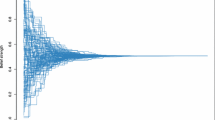Abstract
This paper introduces a second-order adaptive network model for simulating political opinion dynamics, considering cognitive, affective, and social factors. The model, grounded in political psychology and communication theories, illustrates how individuals’ opinions evolve in response to external stimuli such as political parties and media. It also explores the impact of individuals’ reasoning abilities and initial viewpoints on their rationality and cognitive flexibility. Through simulation experiments, the paper demonstrates the model’s capacity to generate realistic outcomes such as homophily and polarization phenomena. It further discusses the model’s implications for mitigating misinformation spread and reducing polarization in political opinion dynamics, identifying key influencing factors and potential interventions. The paper contributes to computational politics by offering an innovative approach to modeling individual and collective opinion formation processes, acknowledging the complexity and adaptivity of cognitive, affective, and social dynamics.
M. Pellemans, M. den Heijer and S. Jansen—Equal contribution
Access this chapter
Tax calculation will be finalised at checkout
Purchases are for personal use only
Similar content being viewed by others
References
Matsubayashi, T.: Do politicians shape public opinion? Br. J. Polit. Sci. 43(2), 451–478 (2012). https://doi.org/10.1017/s0007123412000373
Fan, D.P., Tims, A.R.: The impact of the news media on public opinion: American presidential election 1987–1988. Int. J. Public Opin. Res. 1(2), 151–163 (1989). https://doi.org/10.1093/ijpor/1.2.151
Parker, S.L., Parker, G.R., McCann, J.A.: Opinion taking within friendship networks. Am. J. Polit. Sci. 52(2), 412–420 (2008). https://doi.org/10.1111/j.1540-5907.2008.00320.x
Jennings, M.K., Stoker, L., Bowers, J.: Politics across generations: family transmission reexamined. J. Polit. 71(3), 782–799 (2009). https://doi.org/10.1017/S0022381609090719
Wettstein, M., Wirth, W.: Media effects: how media influence voters. Swiss Polit. Sci. Rev. 23(3), 262–269 (2017). https://doi.org/10.1111/spsr.12263
McGann, A.J., Dellepiane-Avellaneda, S., Bartle, J.: Dynamics of public opinion and policy response under proportional and plurality elections. Econ. Polit. 35(1), 333–355 (2022). https://doi.org/10.1111/ecpo.12217
Tufekci, Z.: Engineering the public: big data, surveillance and computational politics. First Monday (2014). https://doi.org/10.5210/fm.v19i7.4901
Sîrbu, Alina, Loreto, Vittorio, Servedio, Vito D. P.., Tria, Francesca: Opinion dynamics: models, extensions and external effects. In: Loreto, Vittorio, et al. (eds.) Participatory Sensing, Opinions and Collective Awareness. UCS, pp. 363–401. Springer, Cham (2017). https://doi.org/10.1007/978-3-319-25658-0_17
Haq, E.U., Braud, T., Kwon, Y.D., Hui, P.: A survey on computational politics. IEEE Access 8, 197379–197406 (2020). https://doi.org/10.1109/access.2020.3034983
McPherson, M., Smith-Lovin, L., Cook, J.M.: Birds of a feather: homophily in social networks. Ann. Rev. Sociol. 27(1), 415–444 (2001). https://doi.org/10.1146/annurev.soc.27.1.415
Conover, M., Ratkiewicz, J., Francisco, M., Goncalves, B., Menczer, F., Flammini, A.: Political polarization on Twitter. In: Proceedings of the International AAAI Conference on Web and Social Media, vol. 5, no. 1, pp. 89–96 (2021). https://doi.org/10.1609/icwsm.v5i1.14126
Draca, M., Schwarz, C.: How polarized are citizens? Measuring ideology from the ground-up. SSRN Electron. J. (2018). https://doi.org/10.2139/ssrn.3154431
Follmer, R., Kellerhoff, J., Fridolin Wolf, M.A.: Vom Unbehagen an der Vielfalt (2018). https://www.bertelsmann-stiftung.de/de/publikationen/publikation/did/vom-unbehagen-an-der-vielfalt. Accessed 19 February 2024
Axelrod, R.: The dissemination of culture: a model with local convergence and global polarization. J. Conflict Resolut. 41(2), 203–226 (1997)
Benczik, I.J., Benczik, S.Z., Schmittmann, B., Zia, R.K.P.: Opinion dynamics on an adaptive random network. Phys. Rev. E 79, 046104 (2009). https://doi.org/10.1103/PhysRevE.79.046104
Kan, U., Feng, M., Porter, M.A.: An adaptive bounded-confidence model of opinion dynamics on networks. J. Complex Netw. 11(1), cnac055 (2023). https://doi.org/10.1093/comnet/cnac055
Brede, M.: How does active participation affect consensus: adaptive network model of opinion dynamics and influence maximizing rewiring. Complexity (2019). https://doi.org/10.1155/2019/1486909
Mauk, M.: Quality of democracy makes a difference, but not for everyone: how political interest, education, and conceptions of democracy condition the relationship between democratic quality and political trust. Front. Polit. Sci. 3 (2021). https://doi.org/10.3389/fpos.2021.637344
Haidt, J.: The emotional dog and its rational tail: a social intuitionist approach to moral judgment. Psychol. Rev. 108(4), 814–834 (2001). https://doi.org/10.1037/0033-295x.108.4.814
Beck, A.T., Haigh, E.A.: Advances in cognitive theory and therapy: the generic cognitive model. Annu. Rev. Clin. Psychol. 10, 1–24 (2014). https://doi.org/10.1146/annurev-clinpsy-032813-153734
Buechner, B.M., Clarkson, J.J., Otto, A.S., Hirt, E.R., Ho, M.C.: Political ideology and executive functioning: the effect of conservatism and liberalism on cognitive flexibility and working memory performance. Soc. Psychol. Pers. Sci. 12(2), 237–247 (2021). https://doi.org/10.1177/1948550620913187
Zmigrod, L., Burnell, R., Hameleers, M.: The misinformation receptivity framework: political misinformation and disinformation as cognitive Bayesian inference problems. Eur. Psychol. 28, 173–188 (2023). https://doi.org/10.1027/1016-9040/a000498
Treur, J.: Network-Oriented Modeling: Addressing Complexity of Cognitive. Affective and Social Interactions. Springer, Cham (2016). https://doi.org/10.1007/978-3-319-45213-5
Treur, J.: Network-Oriented Modeling for Adaptive Networks: Designing Higher-Order Adaptive Biological, Mental and Social Network Models. Springer, Cham (2020). https://doi.org/10.1007/978-3-030-31445-3
Jolly, S., et al.: Chapel hill expert survey trend file, 1999–2019. Elect. Stud. 75, 102420 (2022). https://doi.org/10.1016/j.electstud.2021.102420
Newman, N., Fletcher, R., Eddy, K., Robertson, C.T., Nielsen, R.K.: Reuters Institute Digital News Report 2023 (2023). https://reutersinstitute.politics.ox.ac.uk/digital-news-report/2023. Accessed 19 February 2024
Author information
Authors and Affiliations
Corresponding author
Editor information
Editors and Affiliations
Rights and permissions
Copyright information
© 2024 IFIP International Federation for Information Processing
About this paper
Cite this paper
Pellemans, M., den Heijer, M., Jansen, S., Treur, J. (2024). A Second-Order Adaptive Network Model for Political Opinion Dynamics. In: Maglogiannis, I., Iliadis, L., Macintyre, J., Avlonitis, M., Papaleonidas, A. (eds) Artificial Intelligence Applications and Innovations. AIAI 2024. IFIP Advances in Information and Communication Technology, vol 713. Springer, Cham. https://doi.org/10.1007/978-3-031-63219-8_23
Download citation
DOI: https://doi.org/10.1007/978-3-031-63219-8_23
Published:
Publisher Name: Springer, Cham
Print ISBN: 978-3-031-63218-1
Online ISBN: 978-3-031-63219-8
eBook Packages: Computer ScienceComputer Science (R0)





